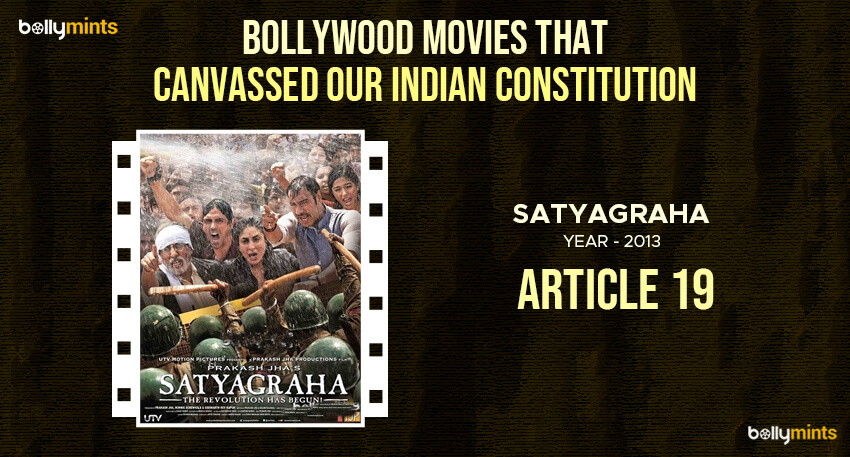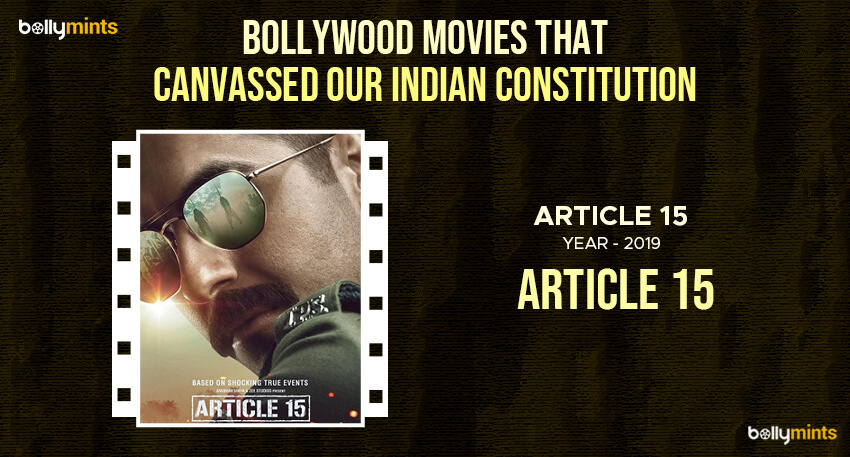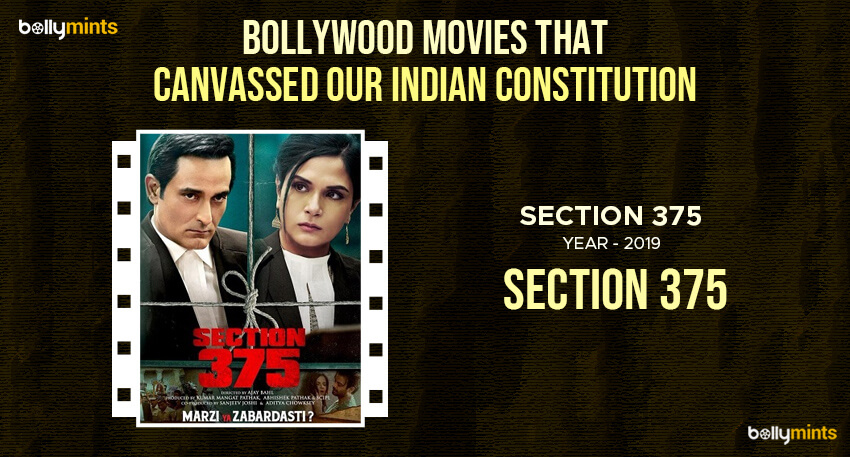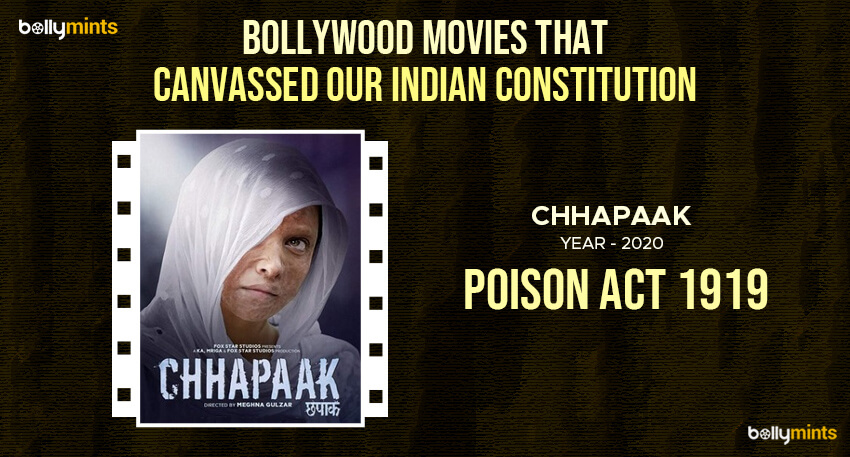Top 11 Bollywood Movies That Canvassed Our Indian Constitution
Posted On: 06 Feb 2023 | Last Updated : 21 Mar 2024 | Views : 17.7k
The Indian constitution is supreme law that provides the framework for political powers, structures and duties of the Indian government, and provides fundamental rights and duties of citizens. The Indian constitution is considered the lengthiest constitution in the world enacted for any sovereign nation. The aim of the Indian constitution is to protect the interest and safeguard the well-being of Indian citizens, which is a topic of interest for people of different domains or professional careers. Similarly, on a number of occasions, the Indian constitution has grabbed the attention of Bollywood filmmakers and scriptwriters, who made reference to the Indian constitution, its articles, sections and acts within the plot of the movies. Such movies have always been praised for their offbeat concepts while keeping the cine-watchers hooked to their seats for enjoying the thrill in the storyline. So, today we will talk about 11 Bollywood movies based on Indian constitution sections and articles.
1. Aarakshan (2011) - Article 16
Directed by Prakash Jha, the 2011 social drama Aarakshan is based on the concept of reservation system followed in the public sector of India for socially and religiously backward people. The movie stars Amitabh Bachchan, Saif Ali Khan, Deepika Padukone, Tanvi Azmi, Pratiek Babbar, and Manoj Bajpayee in important roles.
Plot Summary: The movie revolves around an honest and diligent man named Dr. Anand, who is the principal of STM College. When Dr. Anand learns about the order of the Supreme Court in favour of reservation for the OBCs, which creates a ruckus and conflict between people from upper and lower caste people. Dr. Anand abides by the order of the Supreme Court and with the help of his disciples, he fights against the rights of the vulnerable. However, the group is exposed to a number of obstacles along the way.
The movie is suggestively inspired by Article 16 of the Indian Constitution, which states that everyone is entitled to have equal opportunities to get an education and employment in offices under the control of the State.

2. OMG: Oh My God (2012) - Section 93 in the Railways Act 1989
The comedy-drama directed by Umesh Shukla OMG: Oh My God! features Akshay Kumar, Paresh Rawal, and Mithun Chakraborty in titular roles, and it is one of the top Bollywood movies canvassing the Indian Constitution
Plot Summary: The movie follows the story of an atheist man Kanji Bhai (Paresh Rawal) and his family, who strongly disapproves of the existence of any God. However, his life takes a turn when his antique shop is destroyed due to an earthquake, and when he goes on to get the insurance claim for his shop, he is told that it is an act of God. Kanji Bhai decides to sue God and asks top spiritual leaders to pay him and others back whoever has borne the loss due to an act of God. During his lawsuit, Lord Krishna comes to his aid and helps him restore his faith in God and expose the corrupt spiritual leaders.
The movie is inspired by Section 93 in the Railways Act 1989, which suggests that the law or provision is not responsible for unforeseen or unavoidable situations, which are named as the act of God.

3. Jolly LLB (2013) - Article 21
Subhash Kapoor-directed legal court drama Jolly LLB stars Arshad Warsi, Amrita Rao, and Boman Irani in main cast.
Plot Summary: The movie revolves around a struggling small-time lawyer named Jolly, who comes across the case of hit and run, where the culprit drove over the homeless sleeping on the footpath at night. He hires a proficient lawyer named advocate Rajpal, and the chances of Jolly against him are slim. However, Jolly emphasizes that everyone has the right to live and the right to protect their interest and liberty, despite belonging of any financial background.
The movie makes reference to Article 21 of the Indian Constitution and suggests that everyone is equal in the eyes of law. According to the Article, no person must be deprived of life or personal property unless the procedure is developed by the law. In this regard, the person responsible for the destruction of another person’s life or property is committing a crime according to the law.

4. Satyagraha (2013) - Article 19
The 2013 political drama Satyagraha, directed by Prakash Jha, is one of the top Bollywood films based on the Indian Constitution that features Amitabh Bachchan, Ajay Devgn, Amrita Rao, Kareena Kapoor, Arjun Rampal, and Manoj Bajpayee.
Plot Summary: The movie follows the story of an honest man named Dwarka Anand, who is arrested and sent to jail when he tries to assault the corrupt official while collecting compensation for the death of his son. After his arrest, Manav, the best friend of Dwarka Anand’s dead son, organizes a campaign to protest against the corruption prevailing in the offices owned and governed by the State.
The movie significantly highlights Article 19 of the Indian Constitution, which suggests that everyone has the right and freedom to peacefully assemble without arms and express themselves or jointly protest against something important.

5. Haider (2014) - Armed Forces (Special Powers) Act 1958
Shahid Kapoor and Shraddha Kapoor starrer Haider, directed by Vishal Bhardwaj, also feature Tabu and Irrfan Khan in important supporting roles. The movie takes its inspiration from William Shakespeare’s famous play Hamlet.
Plot Summary: The movie revolves around a young man named Haider, who returns to his hometown in Jammu and Kashmir. However, the state is dealing with a violent insurgency, which has a severe impact on him. Haider just wishes to get closure about his father’s mysterious disappearance and confronts his uncle, whom he suspects has wronged his father. He fails to get any proof that his uncle is behind the disappearance of his father; however, he realizes something much bigger.
The armed and violent insurgency in the state is carried out by the army officers in the region close to the India-Pakistan border in Jammu and Kashmir State under the Armed Forces (Special Powers) Act 1958 to control the situation.

6. Aligarh (2015) / Shubh Mangal Zyada Saavdhan (2020) - Section 377
Aligarh (2015) Plot Summary: Directed by Hansal Mehta, Aligarh is a biographical drama inspired by the true-life story of Ramchandra Siras, a professor at Aligarh University. His life takes a turn when a news channel intervenes in his life and attacks his privacy by revealing his relationship with a man and questioning his sexuality and character. Later, a journalist helps Ramchandra Siras to fight for his justice and regain his respect.
Shubh Mangal Zyada Saavdhan (2020) Plot Summary: Starring Ayushmann Khurrana and Jitendra Kumar, Shubh Mangal Zyada Saavdhan is directed and written by Hitesh Kewalya. The movie revolves around Kartik and Aman, a gay couple, who find it hard to be together due to the opposition from society, especially Aman’s family. However, the couple fights for their love, despite Aman’s family’s constant efforts to get him engaged to a girl.
In both of the movies, Section 377 of the Indian Constitution has been mentioned, which suggests that intercourse activity against the law of nature is punishable. However, the abolition of Section 377 was finally abolished in 2018 after decades of activism, which helped in ensuring inclusivity in India by accepting and legalizing everyone’s sexuality.

7. Mulk (2018) - Article 20(3)
The 2018 legal court drama Mulk is inspired by real-life events. The movie is set in Varanasi and Lucknow in Uttar Pradesh and revolves around a Muslim family. Directed by Anubhav Sinha, the movie stars Taapsee Pannu and Rishi Kapoor.
Plot Summary: The movie highlights the struggles of a Muslim family headed by Murad Ali Mohammed, who lives with his wife, son, and daughter-in-law. Their life takes a turn when Murad’s son gets involved in terrorist activity, and the entire family faces the criticism and consequences. It is then that Murad and his daughter-in-law take to the court of law to prove their innocence and reclaim the honour of their family.
The movie makes reference to Article 20(3) of the Indian Constitution and emphasizes the importance of the Article. The Article suggests that no person accused of committing a crime can be compelled to be the culprit without any evidence. In other words, the Article suggests that the person is innocent before proven guilty. Based on this theme, the movie aims to suggest that mere claims or accusations are enough to declare someone guilty.

8. Article 15 (2019) – Article 15
Anubhav Sinha’s action crime drama, Article 15 is one of the best Bollywood movies based on Indian Constitution articles, namely Article 15 which forbids discrimination on the basis of caste, race, religion, sex, or region of birth.
Plot Summary: The movie follows the story of a police officer named Ayan Ranjan (Ayushmann Khurrana), who is assigned as an Additional Superintendent of Police in Laalgaon village. In the village, Ayan encounters discrimination in various forms. Meanwhile, in the village, two Dalit girls are found dead, and despite the knowledge that the girls were gang raped and killed because of being lower caste and vulnerable, the information is dismissed and instead the rumour is spread that the two girls were lesbians and were killed by their fathers in honour killing. Ayan learns that in the village the wrongdoings of the upper caste people and crimes against the lower caste people are dismissed.
The movie gets its name as Article 15 to highlight that despite the enactment of the rule to monitor and prevent discrimination on any grounds in Indian society, and make equal opportunities available for everyone, discrimination, especially in the rural region continues to persist, which is the reason for worse consequences for the vulnerable.

9. Section 375 (2019) - Section 375
Directed by Ajay Bahl, Section 375 is a legal thriller court drama that features Akshaye Khanna and Richa Chadha in pivotal roles.
Plot Summary: The movie follows the story of well-known Bollywood filmmaker Rohan Khurana (Rahul Bhat) who is accused of rape by a junior costume designer named Anjali Dangle (Meera Chopra). Rohan hires Tarun Saluja (Akshaye Khanna) as his lawyer to defend him against the false claims of Anjali, while Anjali’s case is fought by Hiral Gandhi (Richa Chadha), who believes that Anjali has been wronged. The case gathers the public attention, who sympathize with Anjali and believe the notion that wealthy people often oppress the poor.
The movie takes inspiration from Section 375 of IPC which protects the rights of women who are wronged by men or raped in any circumstances, and the section forms the basis for deciding the punishment for the accused.

10. Chhapaak (2020) - Poison Act 1919
Directed by Meghna Gulzar, the 2020 biographical social drama Chhapaak features Deepika Padukone and Vikrant Massey in lead roles. The movie is inspired by the life events of an acid attack survivor Laxmi, who fought for the rights of other acid attack survivors and worked to improve their condition.
Plot Summary: The movie follows the story of a teenage girl named Malti (a character inspired by Laxmi). Malti is stocked and continuously troubled by a middle-aged man, and when she rejects his proposal, the man, along with his brother and brother’s girlfriend, attacks Malti with acid. Malti survives the attack and takes to the court to get justice. However, she is forced to go through an ordeal procedure in court, while she is still healing mentally. Malti seeks help from a social worker named Amol, who helps her in her fight to ban the easy availability and sale of acid.
The movie tries to cover and highlight Laxmi and her alliance’s efforts to ban the sale of acid to civilians. In this regard, the Poison Act of 1919, regulates and monitors the actions of individuals or organizations dealing with poisons that can be used to harm other people’s life. Thus, Laxmi’s continuous efforts led to the amendment of section 4(2) of the Poison Act 1919, which necessitates the possession of a license for the sale and purchase of acid in the Indian subcontinent.

11. Article 370 (2024) - Article 370
Though quite a few films have been made on the abrogation of Article 370 but director Aditya Suhas Jambhale’s Article 370 starring Yami Gautam was the nearly perfect and detailed perspective of when, why and how 'Article 370' came into existence.
Plot Summary: Article 370 is a political action thriller set against the backdrop of the revocation of the special status of the state of Jammu and Kashmir which was the autonomy granted under Article 370 of the Indian Constitution narrated details without distorting the facts much. The highlight for all to remember was how all precautions were taken into consideration by the central government and state’s security forces while Article 370 was abrogated in parliament in 2019.



